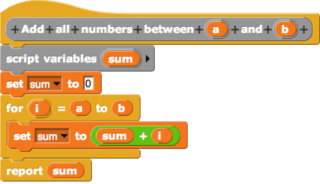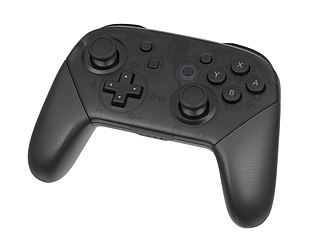
A graphical user interface, or GUI, is a form of user interface that allows users to interact with electronic devices through graphical icons and visual indicators such as secondary notation. In many applications, GUIs are used instead of text-based UIs, which are based on typed command labels or text navigation. GUIs were introduced in reaction to the perceived steep learning curve of command-line interfaces (CLIs), which require commands to be typed on a computer keyboard.

A game controller, gaming controller, or simply controller, is an input device or input/output device used with video games or entertainment systems to provide input to a video game. Input devices that have been classified as game controllers include keyboards, mice, gamepads, and joysticks, as well as special purpose devices, such as steering wheels for driving games and light guns for shooting games. Controllers designs have evolved to include directional pads, multiple buttons, analog sticks, joysticks, motion detection, touch screens and a plethora of other features.

Microsoft Flight Simulator is a series of flight simulator programs for MS-DOS, Classic Mac OS and Microsoft Windows operating systems. It was an early product in the Microsoft application portfolio and differed significantly from Microsoft's other software, which was largely business-oriented. As of November 2022, Microsoft Flight Simulator is the longest-running software product line for Microsoft, predating Windows by three years. Microsoft Flight Simulator is one of the longest-running PC video game series of all time.

Microsoft SideWinder was the general name given to the family of digital game controllers developed by Microsoft for PCs. The line was first launched in 1995. Although intended only for use with Microsoft Windows, Microsoft SideWinder game controllers can also be used with macOS, Mac OS 9 with third-party software, and Linux.

In computing, a visual programming language or block coding is a programming language that lets users create programs by manipulating program elements graphically rather than by specifying them textually. A VPL allows programming with visual expressions, spatial arrangements of text and graphic symbols, used either as elements of syntax or secondary notation. For example, many VPLs are based on the idea of "boxes and arrows", where boxes or other screen objects are treated as entities, connected by arrows, lines or arcs which represent relations.

Microsoft XNA is a freeware set of tools with a managed runtime environment that Microsoft developed to facilitate video game development. XNA is based on .NET Framework, with versions that run on Windows and Xbox 360. XNA Game Studio can help develop XNA games. The XNA toolset was announced on March 24, 2004, at the Game Developers Conference in San Jose, California. A first Community Technology Preview of XNA Build was released on March 14, 2006.

A gamepad is a type of video game controller held in two hands, where the fingers are used to provide input. They are typically the main input device for video game consoles.
In computing, DirectInput is a legacy Microsoft API for collecting input from a computer user, via input devices such as the mouse, keyboard, or a gamepad. It also provides a system for action mapping, which allows the user to assign specific actions within a game to the buttons and axes of the input devices. Additionally it handles haptic feedback (input/output) devices. Microsoft introduced a new input library called XInput specifically for the Xbox 360 controller.
Games for Windows is a discontinued brand owned by Microsoft and introduced in 2006 to coincide with the release of the Windows Vista operating system. The brand itself represents a standardized technical certification program and online service for Windows games, bringing a measure of regulation to the PC game market in much the same way that console manufacturers regulate their platforms. The branding program was open to both first-party and third-party publishers.

Microsoft Robotics Developer Studio is a discontinued Windows-based environment for robot control and simulation that was aimed at academic, hobbyist, and commercial developers and handled a wide variety of robot hardware. It requires a Microsoft Windows 7 operating system or later.

Zune is a discontinued software program that was developed by Microsoft for Windows that functions as a full media player, library, media streaming server, mobile device management, and interface for the discontinued Zune Marketplace. The software is used to sync with all devices with Zune functionality including the Zune 4, 8, 16, 30, 80, 120, Zune HD, Windows Phone 7, and Microsoft Kin. Zune devices work exclusively with the Zune software, which applies many design principles of Microsoft's Metro design language.
Xbox Live Indie Games are video games created by individual developers or small teams of developers released on Microsoft's Xbox Live Marketplace for the Xbox 360. The games were developed using Microsoft XNA, and developed by one or more independent developers that are registered with App Hub. Unlike Xbox Live Arcade titles, these were generally only tested within the local creator community, had much lower costs of production, and generally were less expensive to purchase. The service was released to widespread use alongside the New Xbox Experience, and as of November 2014, over 3,300 games had been released on the service, many receiving media attention. All Indie Games currently require the user to be logged into their Xbox Live account to initiate the start-up of each game. Indie Games were not available in Australia, due to the requirement for all games to be rated by the Australian Classification Board, and the prohibitive expenses involved. The Xbox Live Indie Games program did not continue with the release of the Xbox One, and the marketplace for these games was shuttered on October 7, 2017.
In computing, a natural user interface (NUI) or natural interface is a user interface that is effectively invisible, and remains invisible as the user continuously learns increasingly complex interactions. The word "natural" is used because most computer interfaces use artificial control devices whose operation has to be learned. Examples include voice assistants, such as Alexa and Siri, touch and multitouch interactions on today's mobile phones and tablets, but also touch interfaces invisibly integrated into the textiles furnitures.

Windows Phone Store is an app store platform, developed by Microsoft Corporation for Windows Phone letting users installing various apps on their device. It initially launched with Windows Phone 7 in October 2010. With the rollout of Windows Phone 7.5, Microsoft unveiled the online Marketplace that offers over the air installation of apps. In August 2012, Microsoft renamed Windows Phone Marketplace to Windows Phone Store. In 2015, Microsoft announced that Windows Phone Store would be killed out and replaced by Windows Store which would act as a unified store for all Windows-powered devices. This process was complemented by the Apps on Windows website, an interim solution before the unified Windows Store.

Project Spark is a game creation system video game developed by SkyBox Labs and Team Dakota and published by Microsoft Studios for Microsoft Windows and Xbox One. The game was announced during Microsoft's E3 2013 press event, and was launched as a Windows open beta in December 2013, and an Xbox One beta in March 2014. Project Spark is not available for purchase and online services are also not available as of August 12, 2016. Although no longer available for sale, players can continue to play offline so long as they have both a physical disc, and downloaded local copies of any custom-made creations.

Blockly is a client-side library for the programming language JavaScript for creating block-based visual programming languages (VPLs) and editors. A project of Google, it is free and open-source software released under the Apache License 2.0. It typically runs in a web browser, and visually resembles the language Scratch.

Microsoft HoloLens is an augmented reality (AR)/mixed reality (MR) headset developed and manufactured by Microsoft. HoloLens runs the Windows Mixed Reality platform under the Windows 10 operating system. Some of the positional tracking technology used in HoloLens can trace its lineage to the Microsoft Kinect, an accessory for Microsoft's Xbox 360 and Xbox One game consoles that was introduced in 2010.

The Microsoft Garage is a Microsoft program that encourages employees to work on projects about which they are passionate, despite having no relation to their primary function within the company. Employees from all divisions of Microsoft are free to take part in Microsoft Garage activities and small-scale innovation projects. The Microsoft Garage is a global program with locations on the main campus in Redmond, Washington, and several others spread all over the world, and a website that launched in October 2014 to share experimental projects with customers.

Art of Illusion is a free software, and open source software package for making 3D graphics.












